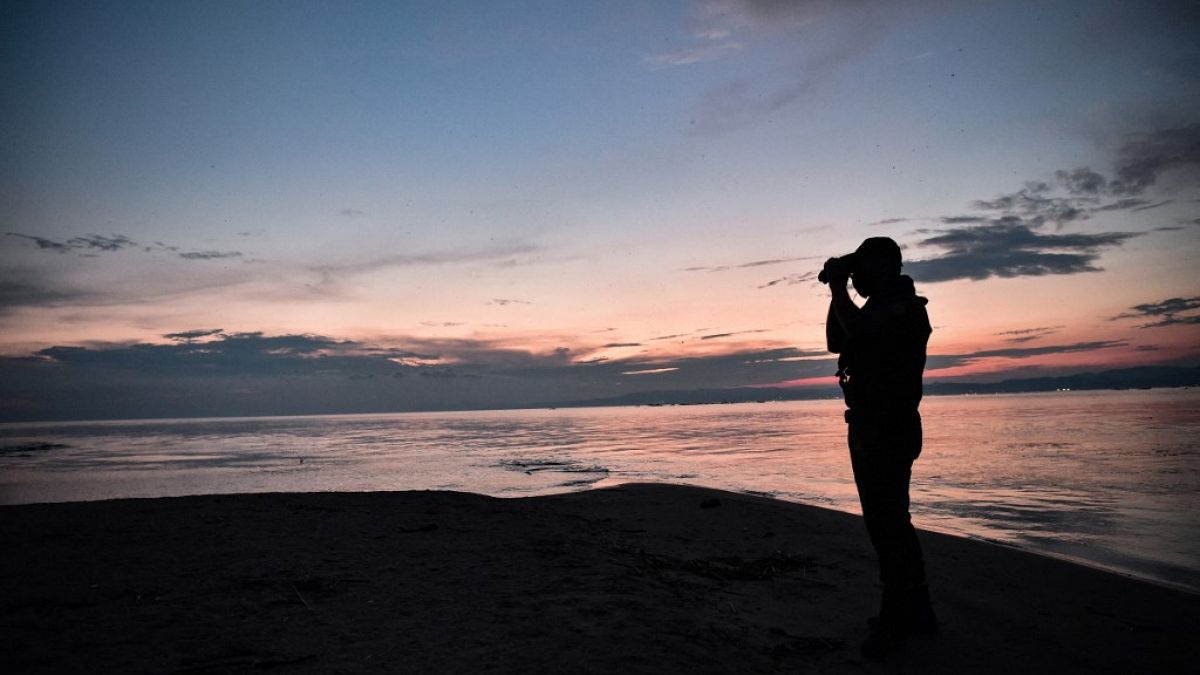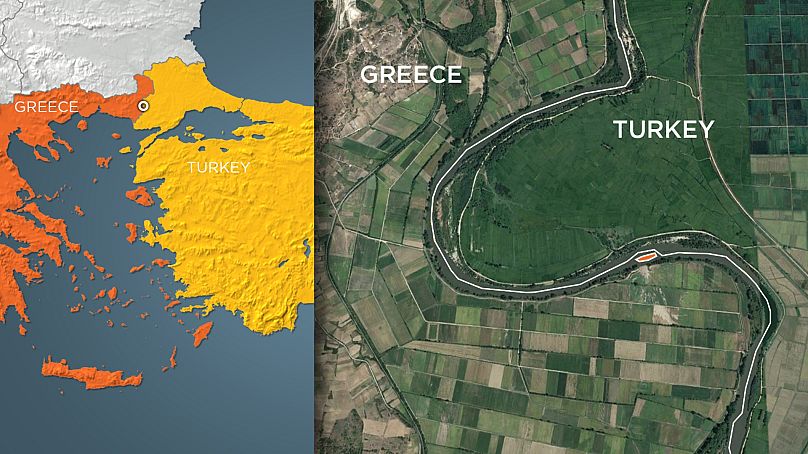What's happening in Greece's Evros region "shows the dark side of EU migration policy", one analyst told Euronews.
NGOs have raised the alarm over a large group of people stranded in a de facto no man's land on the European Union border.
Alarm Phone, a hotline for refugees and migrants in distress, was alerted in mid-July to 52 people - including pregnant women, children as young as three years old and the elderly - stuck on a small islet in the Evros River (known in Turkish as the Meriç River), which separates Greece and Turkey.
They have been stranded there ever since, with the group claiming to have been violently attacked each time they try to escape to either country.
The Border Violence Monitoring Network (BVMN) on Tuesday accused the Greek and Turkish armies of playing "football" with the group, pushing them back and forth between each other's territory, as their humanitarian situation grows increasingly "dire".
Greece's Ministry of Civil Protection has been approached for comment.
In a statement published on Monday, Alarm Phone alleged the besieged group - mostly from Syria and Iraq - had suffered "barbaric violence" during the weeks-long "odyssey" - despite repeated appeals to the authorities to evacuate them.
Authorities have also been called on to urgently provide food, water and medical care, with some members of the group injured and suffering health issues.
Two members of the group are reportedly missing, presumed dead.
"The violent act of leaving people for days being stuck on an islet not only risks physical injuries, but is a mental torment in and of itself that traumatises people," wrote Alarm Phone.
Following the 2015 European Migration Crisis, Greece has been routinely accused of systematically detaining migrants and forcing them out of the EU in a practice known as pushbacks.
Greek officials deny they are happening.
Multiple pushbacks have been recorded by the BVMN and other NGOs where migrants are loaded onto small inflatable dinghies - often by masked men - and dumped on small barren islands within the fast-flowing Evros River.
They then remain in de facto no man's land, outside the territory of either Greece or Turkey. Owing to the unclear status of the islets, authorities have claimed in the past they are outside of their jurisdiction, and therefore also outside their responsibility.
Migrants have reportedly died while trying to swim off the islands or been forced to stay there for prolonged periods of time in wet clothes and freezing conditions, typically without water or supplies, after being forced to jump into the water and wade to the islands.
"The situation at the Evros land border between Greece and Turkey is untenable," said Hope Barker, policy analyst at BVMN. "Violence is routine and an everyday occurrence, people on the move are dying and going missing."
"What's happening in Evros shows the dark side of EU migration policy that has been pushed away from the eyes of Northern European states and is playing out in the shadowy militarised zones of frontline states where it can neither be seen nor heard."
Alarm Phone said it alerted the Greek authorities on 13 July about the trapped group. Greek officials informed them on 22 July that despite “extensive searches... no human presence was found," they said.
The BVMN called Greece's claim "implausible" given the "extensive funding" they received from the EU to police the border, alleging they were "concealing pushback operations".
Days later, on 28 July, the group informed Alarm Phone they had been stormed by "police and mercenaries... [who] started to hit the world," forcing some to flee into the water.
The group sent a video purporting to show the abuse, though Euronews cannot verify its authenticity.
Facing an untenable situation, the group reportedly tried to leave the islet on 3 August, but were intercepted by what they called "police".
One woman alleged she and other female members of the group were made to strip, with the men forced to stare at them, before they were returned to the island.
The group claimed to have been assaulted once again on 7 August, which the BVMN reported put them in "extreme distress", with some members of the group now in a "critical medical condition".
These reports are consistent with a well-established pattern documented by BVMN and other NGOs regarding pushbacks from Greece.
In 196 push-back victims' testimonies collected by the BVMN since 2019, 92% contained reports of physical beatings and 58% of individuals being forcibly undressed.
Forced stripping has also been documented by Human Rights Watch, besides assaults and theft against migrants in the Evros region by the Greek authorities.
Greece denies engaging in illegal activity at their borders.
All individuals inside the EU are protected from inhuman or degrading treatment and punishment, under the bloc's Charter of Fundamental Rights.
Turkey, which signed a €16 billion with the EU to stop people travelling irregularly to Greece, is obligated to offer people the right to claim asylum under the Universal Declaration of Human Rights. It is currently home to the world's largest refugee population, hosting 3.7 million people according to the UNHCR.
“Greece protects the external borders of the European Union, in total compliance with international law and in full respect of the [EU] Charter of Fundamental Rights,” Greek Migration Minister Notis Mitarachi insisted early last year.
BVMN policy analyst Barker called on the EU to stem pushbacks, which the UNHCR, the UN’s refugee agency, has warned that they “risk becoming normalised, and policy based”.
"The EU cannot wash its hands of what is happening in the Evros border region, this is a direct result of their pushback policy which has become the silent, unspoken, yet central pillar of EU migration management," said BVMN policy analyst Barker.
"When people are systematically not given access to asylum, have their rights violated, and are attacked, and the Commission says nothing - they are complicit."
Strandings on these islets are far from isolated. In August 2022, the BVMN documented a case of a large group of mostly Syrian nationals, who were trapped there for weeks in the extreme heat, without access to food or water.

